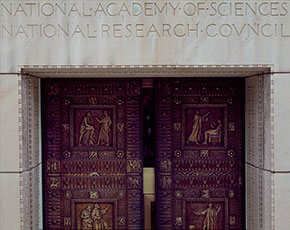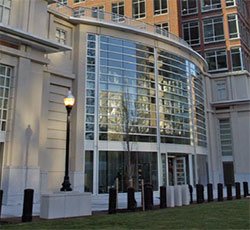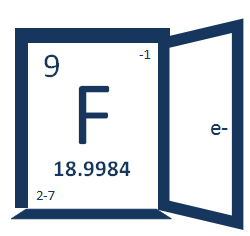why we don't call people with questions about fluoride anti-science
Our approach to science communication at Fluoride Exposed

University of Washington Suzzallo Library in Seattle is open to the public & contains over 2 million holdings in a variety of disciplines, including all the sciences. Credit: Martin Kraft (photo.martinkraft.com), License: CC BY-SA 3.0 via Wikimedia Commons.

National Academy of Sciences (NAS), Washington, D.C. Operating under a congressional charter originally signed by President Lincoln in 1863, NAS holds many scientific meetings, talks, and events that are open to the public. Credit: Maxwell MacKenzie/NAS
Some examples of open doors in scientific institutions

University of Pennsylvania Van Pelt Library in Philadelphia is the main library in one of the nation's top schools in science, and is open to the public during business hours.

National Academy of Sciences (NAS), Washington, D.C. Operating under a congressional charter originally signed by President Lincoln in 1863, NAS holds many scientific meetings, talks, and events that are open to the public. Credit: Carol Highsmith

U.S. Environmental Protection Agency headquarters at One & Two Potomac Yard in Arlington, Virginia. Meetings here are open to the public, such as meetings exploring the latest science on toxic chemical risk levels to go in to EPA's IRIS database. Credit: Steven King/NIEHS
As you can see right up there in our logo, Fluoride Exposed has an open-door policy.
And so does science.
Science has a lot of unlocked doors you could use to get in to the inner sanctums of knowledge and inquiry.
There are a lot of open doors leading in to the halls of science.
But an open-door policy is not enough.
Unlocked doors don't mean the professionals working inside the halls of science speak a language we all understand. Open doors can lead to byzantine hallways and cumbersome flights of stairs.
Which brings us to one of many Carl Sagan quotes that inspire us and everything we are doing at Fluoride Exposed …
"In exchange for freedom of inquiry, scientists are obliged to explain their work."
In general, scientists do not do such a great job explaining their work to others outside their particular field, do they? And when they do, too many of them are kind of stuck-up know-it-all stick-in-the-muds about it, aren't they?
"Our trust in science, like science itself, should be based on evidence, and that means that scientists have to become better communicators. They have to explain to us not just what they know but how they know it...."Naomi Oreskes
Nowhere is that more apparent than when people have questions about fluoride. Especially if you have questions and concerns about fluoride in water.
Doctors, dentists, and public health professionals – so used to talking to each other in the specialized vocabulary of their field – often grasp for things to say about the "optimal level" of fluoride. They start talking about "ppm" and "caries" and assume you know what every department at the CDC, EPA, FDA, ADA, APA, and IOM is and does.
Either that or they give some dumbed-down pat answer that doesn't even begin to get at your questions.
Water and environmental scientists spout out a bunch of unintelligible jargon about fluoride, too, and what they say does not seem to jive at all with what the public health people say. Our nation's public health agencies promote adding fluoride to water, while our nation's environmental science agencies describe fluoride as a contaminant and pollutant.
We think fluoride is the quintessential case of scientists doing a piss-poor job of explaining their work to others.
Despite the fact that all of the greatest scientific organizations say fluoridation is safe and effective, fluoride in water has remained a public controversy for over 65 years. It is one of the longest running pseudoscience vs. science controversies out there.
Is that because there is a big conspiracy? Is it because the public is irrational? Or is it because the best math and science nerds suck at communicating their work in math and science with others? (Hint: a big part of the explanation is math and science nerds' weakness in science communication.)
Read more about how fluoride is the poster child of bad science communication.
Add in all the pseudoscience and conspiracy thinking that surrounds fluoride and you've got a real recipe for WTF!?*
*That's what the fluoride?
What were you thinking we meant?
And the worst is that some scientists – or their supporters – trying to convey the complexities of how environmental science and public health are not at odds over fluoride, even though it may sound like they are ... well, between the complexities and trying to break out of their jargon, they get frustrated. They become condescending. They throw up their hands, and in an exasperated huff, ask you to just "trust us."
But do they listen to you long enough to hear your concerns and understand your questions?
They may not.
But we have.
We have spent countless hours reading people's questions and comments online ... and countless more talking to people in person.
We've read and listened to people who support fluoride, people who oppose fluoride, people who are uncertain about fluoride, and people who don't care about fluoride.
Same goes for science generally. We have read and listened to lots of people who support science. Especially people who love science with a passion – because we ourselves love science. We love it so much that we have emblazoned how we ❤ heart ❤ science all over Fluoride Exposed.
We ❤ science
But we've also read and listened to people who find fault in science. And we have listened with empathy. Why? Because as much as we love science, we love people more – so we listen to people, even if they have a bone to pick with our favorite subject.
In particular, we have read and listened to people who are tired of arrogance from scientists and science supporters. They are tired of science supporters who call other people names. They are tired of science supporters who act like jerks. They are tired of science supporters who heap scorn on other people's beliefs and opinions.
You know who else was tired of arrogance from scientists and science supporters? Carl Sagan. Twenty years ago. We give you more words from Sagan when he was speaking to science supporters:
"People are not stupid. They believe things for a reason."
"The least effective way ... to get the attention of these bright, curious, interested people is to belittle, or condescend, or show arrogance toward their beliefs."
We couldn't agree more. There is no room here for insults, rudeness, or put downs.
Sagan himself had an incredible amount of success in bringing science to the people. How? With empathy and confidence in people's smarts. So we're gonna do our best to follow Sagan's lead. We won't talk down to people here. We won't belittle anyone's beliefs at Fluoride Exposed.
We are going to double down on respect, understanding, and kindness. The kind of respect and understanding that science communication depends on.
And that's why we won't be calling anyone stupid here. We won't be calling anyone selfish. We won't be debunking people or referring to anyone as a woo-woo or a nut or a quack ...
In other words, it's the reason why we won't be calling anyone anti-science here.
We value you and your questions about fluoride, fluoridation, and science, whoever you are and whatever you believe.
And that's why in our approach to science communication at Fluoride Exposed, we won't be calling people who have questions about fluoride anti-science.
What else do we value here? What are our other reasons for creating this site? You can read more about our motivations and values in:
-
Warning: asking hard questions drives the scientific method ...
And our mission at Fluoride Exposed -
How Fluoride Exposed is flipping fluoride conspiracy thinking for science learning
Taking advantage of fluoride controversy to explore all kinds of science questions
Or you could...
Read on for HOW ALL THIS WORKS
Or go back to WHAT WE'RE DOING HERE AND WHY
